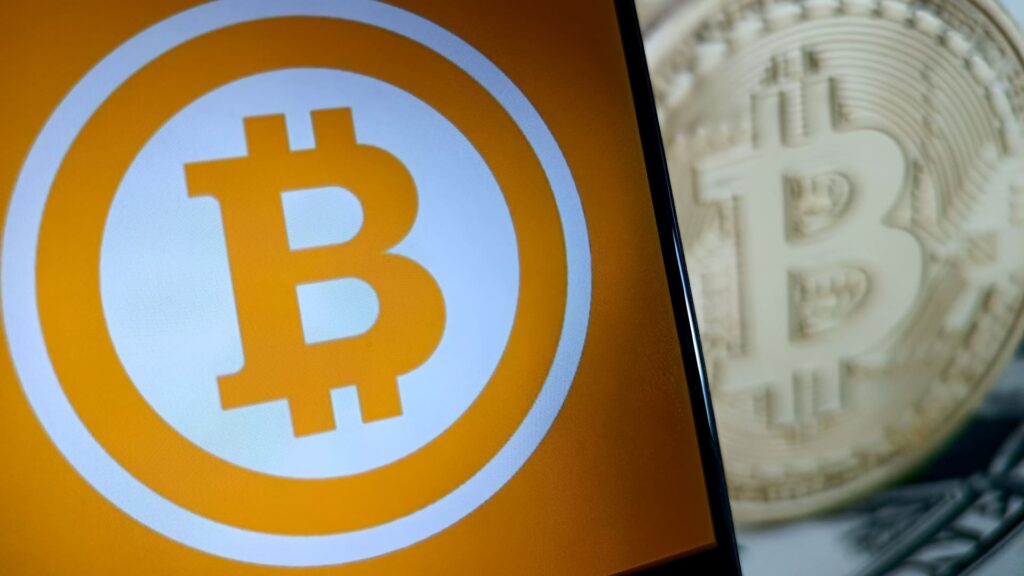BlackRock’s ETF chief says 75% of its bitcoin buyers are crypto fans new to Wall Street

Marquee at the main entrance to BlackRock headquarters building in Manhattan.
Erik Mcgregor | Lightrocket | Getty Images
SALT LAKE CITY — A year ago, Samara Cohen believed there was so much pent-up demand for bitcoin that she and her team at BlackRock launched one of the first-ever spot bitcoin exchange-traded products in the U.S. Now investors are flocking in, and a lot of them are crypto enthusiasts who are new to Wall Street.
Cohen, who heads up the asset manager’s exchange-traded funds and index investments as chief investment officer, told CNBC that BlackRock now sees the demand was for a better way to access bitcoin. “It was for the ETF wrapper,” she told CNBC on stage at the Permissionless Conference in Utah.
The total market cap of all eleven spot bitcoin ETFs now tops $63 billion, with total flows of nearly $20 billion. In the last five trading days alone, spot bitcoin ETFs have seen net inflows of more than $2.1 billion, with BlackRock accounting for half of those sales.
The spike in trading volume comes as bitcoin hit its highest level since July this week, trading above $68,300. Bitcoin ended the third quarter up around 140% from the same quarter a year ago, outpacing the S&P 500, as these spot token funds and the crypto market cap move higher in lock-step. Crypto-aligned stock Coinbase closed up about 24% this week, its best week since February.
Cohen told CNBC that part of the strategy for attracting customers to its funds was teaching crypto investors about the benefits of exchange-traded products (ETPs).
13F filings, which offer quarterly reads on equity positions taken by large investors, show that 80% of the buyers of these new spot bitcoin products in the U.S. are direct investors. Of the 80% of direct investors, Cohen told CNBC that 75% had never before owned an iShare, one of the best-known and largest ETF providers on the planet.
“So we went into this journey with the expectation that we needed to educate ETF investors on crypto and on bitcoin specifically,” said Cohen. “As it turns out, we have done a lot of education of crypto investors on the benefits of the ETP wrapper.”
Before the U.S. Securities and Exchange Commission green-lit spot bitcoin funds in January, investors had a few ways to buy and custody cryptocurrencies. A centralized exchange like Coinbase was among the most user-friendly options for U.S investors. But the blockbuster debut of bitcoin ETPs has laid bare to Cohen and others across Wall Street, that crypto exchanges weren’t giving digital asset investors everything they needed.

BlackRock’s IBIT vs. bitcoin YTD
It helps that the U.S. is a huge market for digital assets. New data from Chainalysis shows that North America remains the biggest crypto market globally, accounting for nearly 23% of all crypto trading volume. The blockchain analytics platform estimates that between July 2023 and July 2024, there was $1.3 trillion in on-chain value received.
Venture firm a16z found in its recently released State of Crypto report that more than 40 million Americans hold crypto.
So far, adoption has mostly been through wealth management clients asking advisors to add new spot crypto products to their portfolio.

In August, Morgan Stanley was the first big bank to allow its 15,000 financial advisors to pitch bitcoin ETFs from BlackRock and Fidelity to clients with a net worth over $1.5 million. Other firms are still performing in-house due diligence before allowing their armies of FAs to start actively pitching the funds.
“Wealth manager allocators have not been allocating,” VanEck CEO Jan van Eck told CNBC in Utah. “I mean, they’re barely even warming up.”
Van Eck drew parallels to the European market, where the company has 12 token-based products trading in Europe.
“It’s exactly what we see in Europe,” he said. “Very few private banks have really approved investment in bitcoin or ethereum or anything else in a major way.” Van Eck said his company has about $2 billion in its European crypto ETPs, and that a lot of the volume is from individual investors.
Wall Street needs rules from lawmakers on Capitol Hill before it gets more comfortable with crypto.
ETFs create transparency
Cohen thinks that in a lot of ways, ETFs and blockchain technology are solving for similar things.
“ETFs have been a decentralizing force in TradFi markets that have brought a lot more access and transparency, and importantly, really accelerated in growth during the post crisis 2008, 2009 period,” said Cohen, referring to traditional finance markets.
“I find it incredibly meaningful to look at the fact that the bitcoin whitepaper was published on October 31, 2008, and then you have the G20 leaders from around the world meeting to discuss the aftermath of the financial crisis and how do you create more transparency through public reporting,” Cohen continued.
BlackRock took on less risk by using counterparty clearing and multilateral trading. In TradFi markets, those moves created huge tailwinds for ETFs.
“Then at the same time, DeFi is becoming a reality over the intervening 15 years,” she said.
“Was this a win for Bitcoin? Was this a win for ETPs? To me, the answer is: It’s a win for investors, to the extent we can effectively marry these ecosystems which are solving for the same goals.”

#BlackRocks #ETF #chief #bitcoin #buyers #crypto #fans #Wall #Street
News plays a pivotal role in our lives by keeping us informed and connected to the world. It serves as a critical source of information, offering updates on current events, politics, economics, science, and more. Through news, we gain awareness of global issues and local developments, helping us make informed decisions in our personal and professional lives. News also fosters discussion and debate, encouraging critical thinking and perspective-taking. Moreover, it promotes transparency and accountability among governments, businesses, and other institutions. In a rapidly changing world, staying updated with the news enables us to adapt to new challenges and opportunities, shaping our understanding of the complexities of society. Ultimately, news is not just about information; it empowers us to participate actively in the world around us, contributing to a more informed, engaged, and responsible global citizenry.
Health is fundamental to our well-being and quality of life, making it an essential aspect of daily existence. It encompasses physical, mental, and emotional aspects, influencing our ability to function effectively and enjoy life fully. Prioritizing health allows individuals to maintain optimal physical fitness, reducing the risk of diseases and promoting longevity. Mental health, equally crucial, affects our cognitive abilities, emotional stability, and overall happiness. Investing in preventive healthcare through exercise, balanced nutrition, and regular medical check-ups helps in early detection of potential health issues, ensuring timely intervention and treatment. Beyond individual benefits, a population’s health impacts societal productivity and economic stability. Governments and organizations worldwide emphasize public health initiatives to address pandemics, health disparities, and promote overall well-being. Ultimately, health serves as the foundation upon which we build our lives, influencing our ability to pursue goals, nurture relationships, and contribute meaningfully to society.
Money plays a crucial role in our lives as a means of financial security and freedom. It enables us to meet basic needs such as food, shelter, and healthcare, while also providing opportunities for education, travel, and personal growth. Beyond material comforts, money facilitates social connections and experiences that enrich our lives. It empowers individuals to invest in their futures, whether through savings, investments, or entrepreneurial ventures, thereby fostering economic stability and growth. However, the pursuit of wealth should also be balanced with ethical considerations, as money can influence relationships and societal dynamics. Responsible management of finances is key to achieving long-term goals and mitigating financial stress. Ultimately, while money is a tool for achieving aspirations and fulfilling desires, its true value lies in how it is utilized to improve both personal well-being and the broader community.
Earning Easy Money in 2024: Opportunities and Considerations 💸
In 2024, the landscape of earning easy money presents diverse opportunities, albeit with considerations. The digital age offers platforms for freelancing, online trading, and e-commerce, allowing individuals to leverage skills and creativity for financial gain. Cryptocurrency investments continue to allure with potential for quick profits, yet they entail high volatility and risk. Moreover, the rise of the gig economy enables flexible work arrangements through apps and websites, offering quick payouts but often without job security or benefits. Passive income streams such as rental properties and investments in stocks or bonds remain viable, but demand initial capital and ongoing management. Amid these options, caution is essential to avoid scams and unsustainable ventures promising overnight success. Ultimately, while the allure of easy money persists, informed decisions, diligence, and a long-term perspective are crucial for sustainable financial growth and security in the dynamic year ahead.






